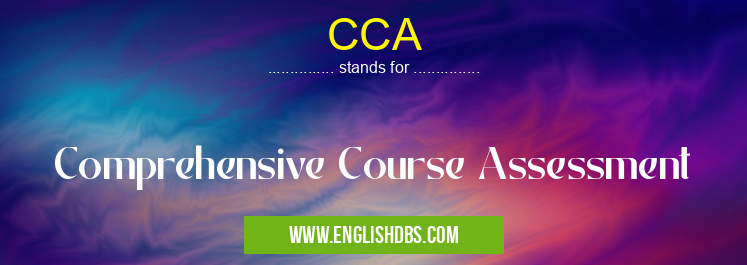What does CCA mean in UNCLASSIFIED
CCA (Comprehensive Course Assessment) is a comprehensive assessment that measures a student's understanding of a specific subject or course. It typically encompasses a wide range of skills and knowledge, and may include multiple components such as exams, projects, and presentations.

CCA meaning in Unclassified in Miscellaneous
CCA mostly used in an acronym Unclassified in Category Miscellaneous that means Comprehensive Course Assessment
Shorthand: CCA,
Full Form: Comprehensive Course Assessment
For more information of "Comprehensive Course Assessment", see the section below.
Components
- Exams: Written or oral tests that assess a student's knowledge and understanding of the course material.
- Projects: Assignments that require students to apply their knowledge and skills in a practical setting.
- Presentations: Opportunities for students to demonstrate their communication and critical thinking abilities by presenting their findings or insights.
Benefits
- Comprehensive Evaluation: Provides a comprehensive assessment of a student's understanding of a subject, allowing instructors to identify areas of strength and weakness.
- Student Feedback: Offers students valuable feedback on their progress and areas where improvement is needed.
- Improved Learning Outcomes: Encourages students to engage with the course material in a comprehensive manner, leading to deeper understanding and retention.
- Skill Development: Develops students' research, analytical, communication, and critical thinking skills.
Essential Questions and Answers on Comprehensive Course Assessment in "MISCELLANEOUS»UNFILED"
What is a Comprehensive Course Assessment (CCA)?
A Comprehensive Course Assessment (CCA) is a systematic process for evaluating the effectiveness of a course. It involves gathering data from multiple sources, including students, instructors, and other stakeholders, to assess the course's objectives, content, teaching methods, and impact on student learning.
Why are CCAs important?
CCAs provide valuable feedback to instructors and institutions on the effectiveness of their courses. They help identify areas for improvement, ensure alignment with course objectives, and enhance the overall learning experience for students.
What are the components of a CCA?
CCAs typically include surveys, focus groups, interviews, and analysis of student work. Data from these sources are used to assess the course's content, teaching strategies, student engagement, and overall effectiveness.
Who conducts CCAs?
CCAs can be conducted by instructors, external evaluators, or a combination of both. Involving external evaluators can provide objectivity and a fresh perspective.
How can students participate in a CCA?
Students can participate in CCAs by completing surveys, providing feedback in focus groups or interviews, and submitting course work for evaluation. Their perspectives are essential for assessing the course's effectiveness and impact on their learning.
How are the results of a CCA used?
The results of a CCA are used to inform decisions about course improvement, curriculum design, and teaching practices. They can also be used to support faculty development and accreditation processes.
How often should CCAs be conducted?
The frequency of CCAs varies depending on the institution and the purpose of the assessment. Some courses may be assessed every semester, while others may be assessed less frequently.
Final Words: CCA (Comprehensive Course Assessment) is an important tool for evaluating student learning and providing feedback. By assessing a wide range of skills and knowledge, it ensures a comprehensive evaluation that supports student growth and improves learning outcomes.
CCA also stands for: |
|
| All stands for CCA |
